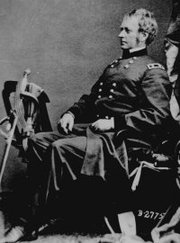Joseph Hooker
|
|
- This article is about Joseph Hooker, the U.S. Civil War Major General. For the English botanist, see: Joseph Dalton Hooker.
Joseph Hooker (November 13, 1814–October 31, 1879) was a Major General in the Union Army during the American Civil War. He was a 1837 graduate of West Point and served in the Mexican War. As a civilian between the wars, he settled in California as a farmer and land developer.
Hooker led a brigade and then division around Washington, D.C., and then joined the Army of the Potomac for the Peninsula Campaign in 1862. He was transferred to John Pope's Army of Virginia for the Second Battle of Bull Run. Returned to the Army of the Potomac, he achieved corps command and fought well in the Battle of Antietam and the Battle of Fredericksburg. He replaced Ambrose Burnside as commander of the Army of the Potomac in 1863 after Burnside was defeated at Fredericksburg. During the spring of 1863 he established a reputation as an outstanding administrator and restored the morale of his soldiers through reforms in health and welfare programs.
Hooker commanded the Army of the Potomac during the Battle of Chancellorsville where his planned campaign to defeat the Army of Northern Virginia was stopped by Confederate General Robert E. Lee through a devastating attack on Hooker's exposed right flank by General Thomas “Stonewall” Jackson, and by Hooker's timid command performance. A number of his subordinate generals, including Darius N. Couch and Henry W. Slocum openly questioned Hooker's command decisions. Hooker resigned two months later during the early part of the Gettysburg campaign, due to disagreements with Abraham Lincoln and Maj. Gen. Henry Halleck, and was replaced by Maj. Gen. George Meade.
Hooker went on to gain a reputation as a solid commander when he was transferred with the XI and XII Corps of the Army of the Potomac westward to reinforce the Army of the Cumberland around Chattanooga, Tennessee. Hooker was in command at the Battle of Lookout Mountain (also known as the "Battle Above the Clouds") and succeeded in capturing the important mountain for the Union.
Hooker participated in the Atlanta Campaign under William Tecumseh Sherman, but asked to be relieved before the capture of the city, due to his dissatisfaction with the promotion of another general (Oliver O. Howard) who had less seniority. He was transferred to the north where he remained for the rest of the war.
Hooker was popularly known as "Fighting Joe" Hooker, a nickname he detested. When a newspaper dispatch arrived in New York during the Peninsula Campaign, a typographical error changed an entry “Fighting — Joe Hooker” to remove the dash and the name stuck. Robert E. Lee occasionally referred to him as "Mr. F. J. Hooker" in a mildly sarcastic jab at his opponent.
Despite Hooker's reputation as a hard-drinking ladies' man, there is no basis for the popular legend that the slang term for prostitutes came from his last name due to parties and a lack of military discipline at his headquarters. The term "hooker" was used in print as early as 1845, many years before Hooker was a public figure.
Hooker died in Garden City, New York and is buried in Cincinnati, Ohio.
| Preceded by: Ambrose Burnside | Commander of the Army of the Potomac 1863 | Succeeded by: George Gordon Meade |

